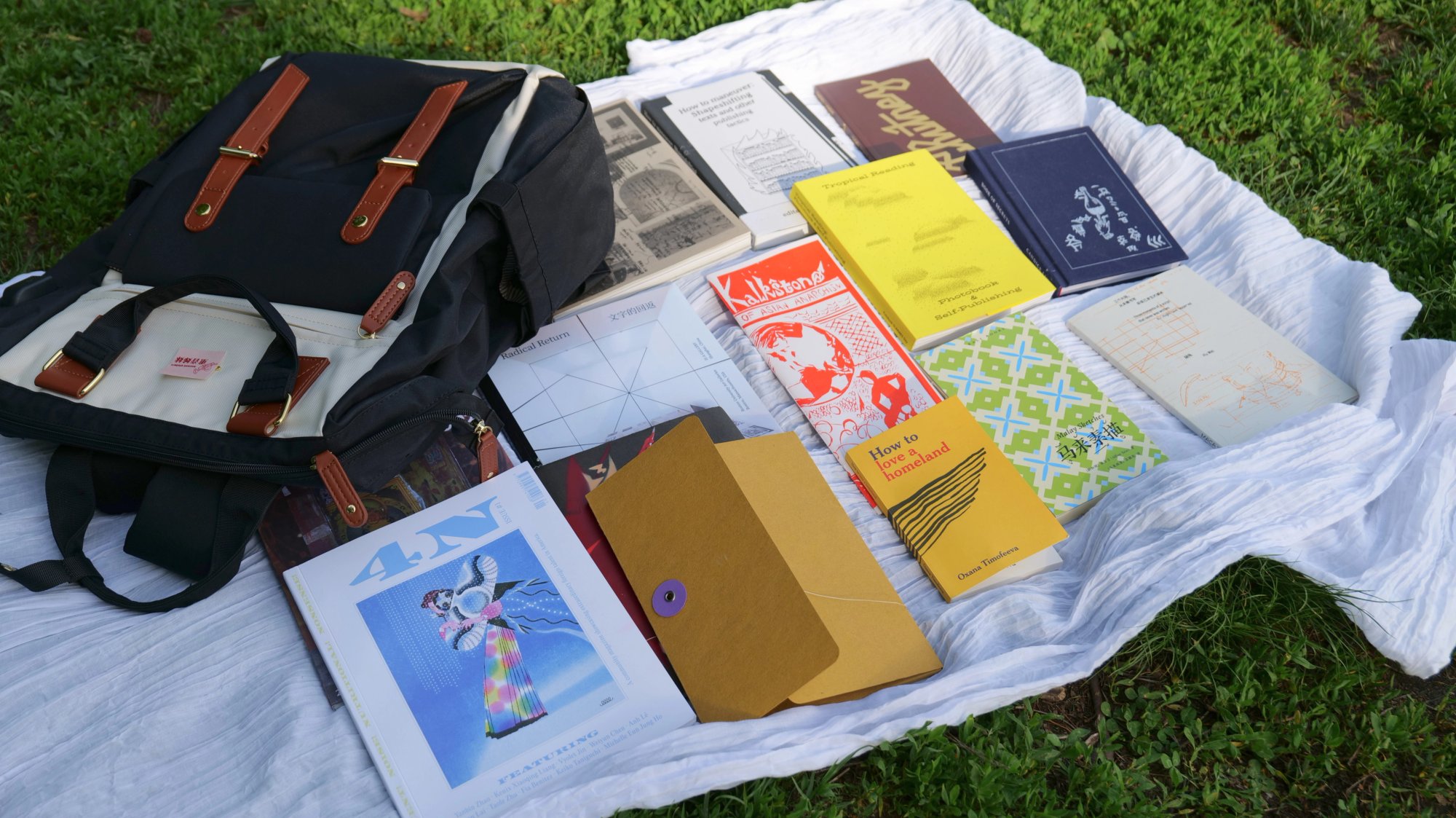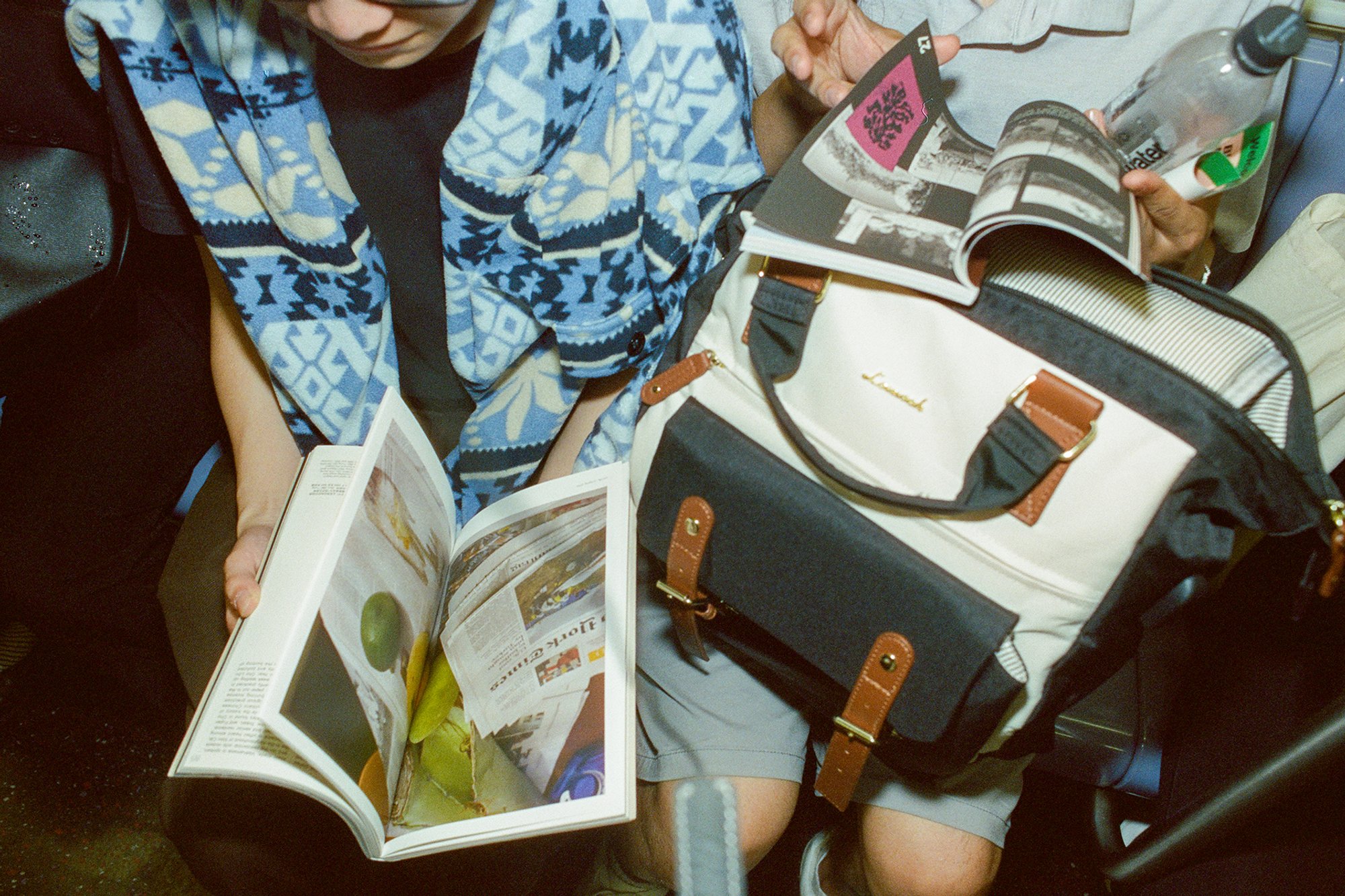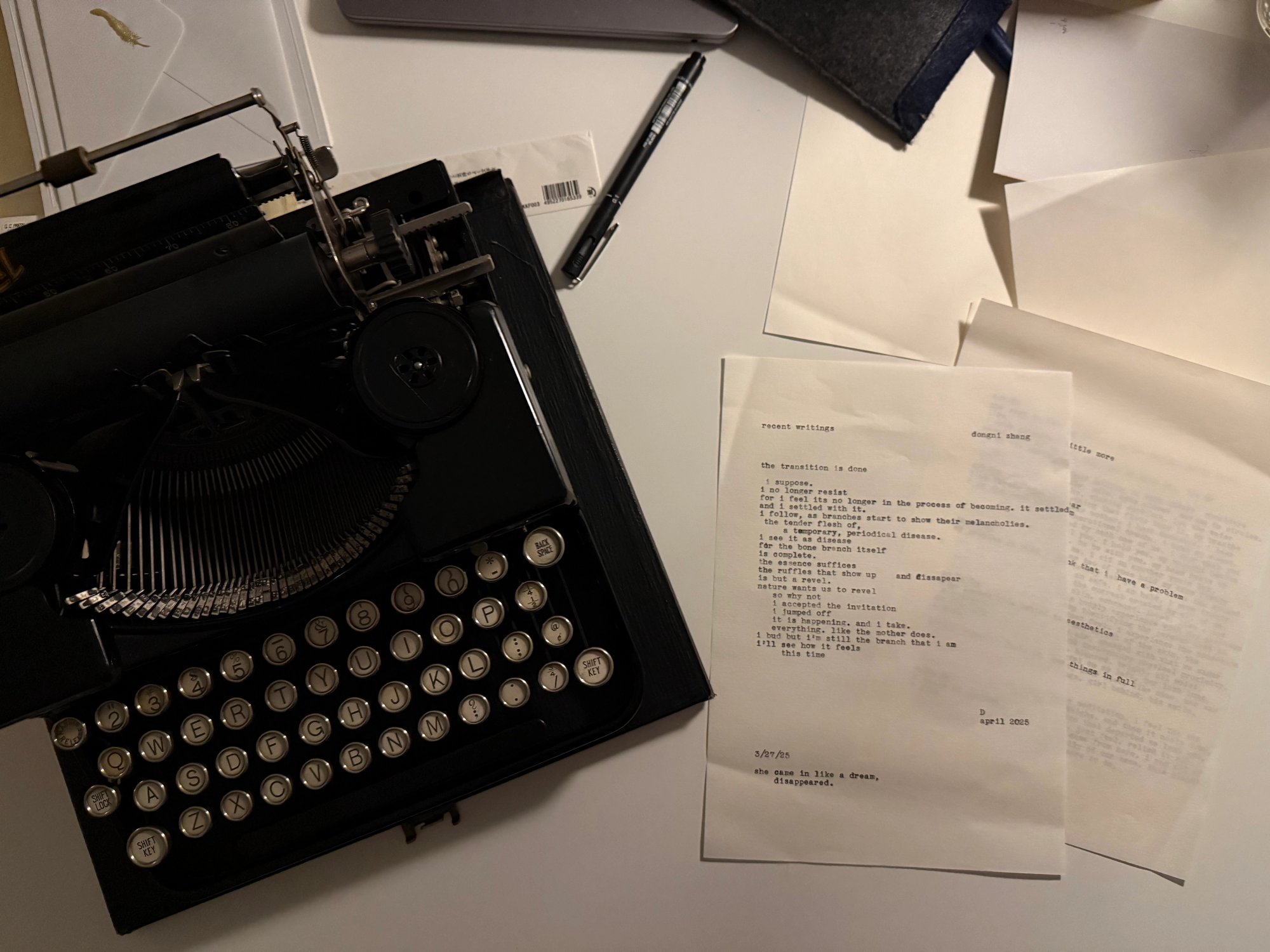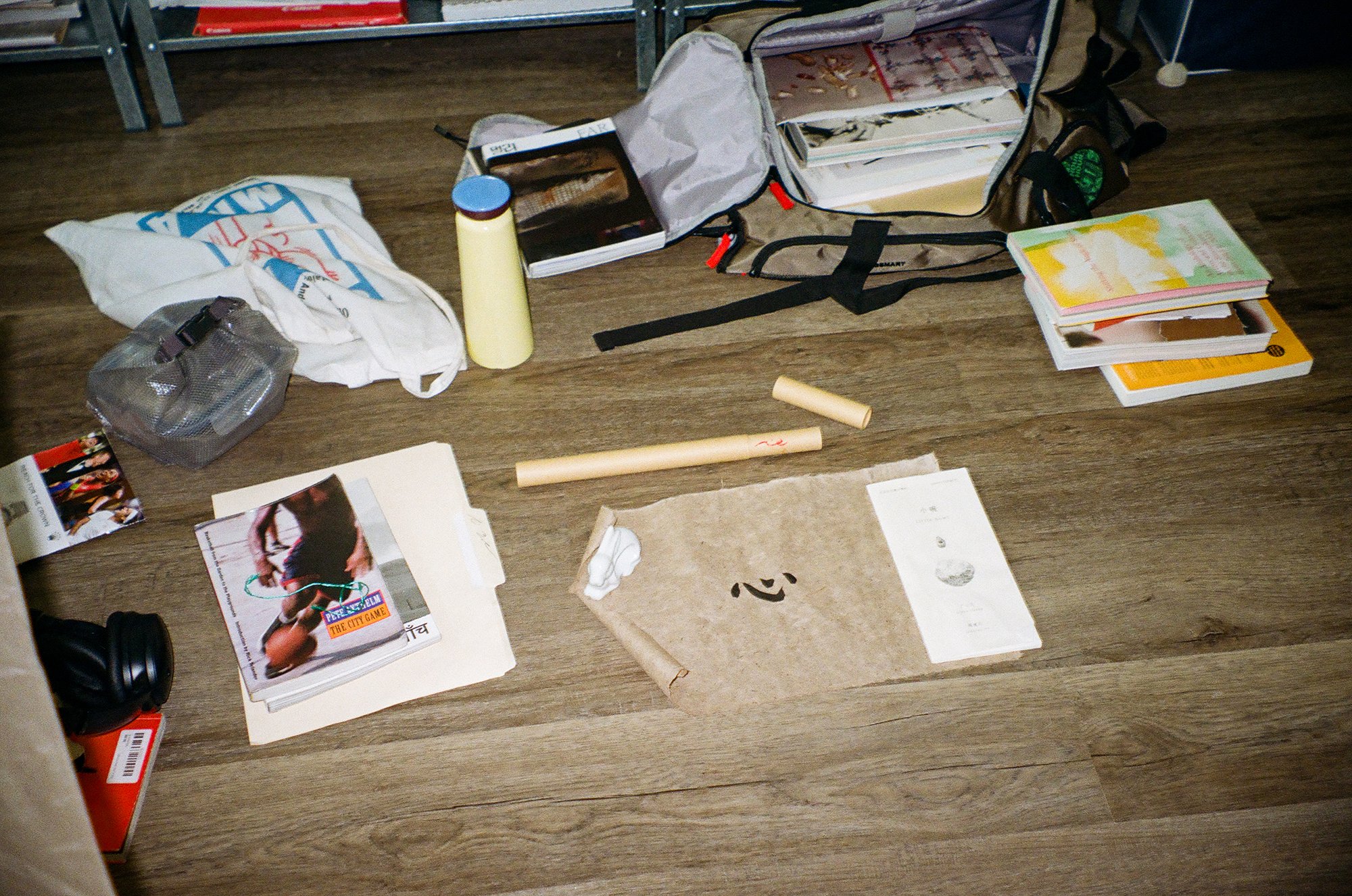Librarians-in-Residence: Publications
DRIFTING BACKPACK: TO PASS IS TO PRESERVE
te editions
‘Drifting Backpack offers a framework to collectively reimagine the experience of life in transit. In this process, we build mutual support and connection, outlining a dynamic and ever-shifting archipelago of relations.’ Huiqi He, New York

Drifting Backpack was brought to McCarren Park in Brooklyn by bookkeeper Huiqi He. Photo by Huiqi He.Image courtesy of te editions
As 2025 Librarians-in-Residence at Asymmetry, we are based in New York, and seek to reimagine the role of the library from our personal experiences—how it can carry the voices and emotions of our community, both individual and collective, across the Atlantic. Today, Asian communities in America are confronting tightening immigration policies. Individual lives are trapped in the cold grip of political struggles—a situation that is, nevertheless, not without precedent in Asian American history. At a book fair we attended this May in New York, we witnessed how Chinese international students have been placed in precarious positions by explicit US government threats of deportation, never knowing if they could stay or be forced to leave. Suspended in this state of perpetual waiting, physical books have become a burden for those facing potential departure, even if they carry the language we think through, and fragments of a place we may never return to. It is within this cloud of uncertainty around forced dislocation that we reconsider the meaning of the library: does it have to be a fixed space, or could it be collectively built and shared? And might the heaviness of physical books be reimagined as something fluid, something we carry with us as we move? We agree with Robert Bringhurst that ‘the Library was here before we were. We live in it.’[1] This interpretation frees the library from physical restrictions, enabling us to see it as a non-fixed network of practice.
Elizabeth Haines also reminds us that ‘the library then, is an odd kind of space, an architecture designed for the coincidence of pseudo-autonomous reading bodies, a place where people read not with or to but alongside each other.’[2] The library not only stores memory passively, but also creates publicness through passing and sharing. Drifting Backpack responds to this idea. From May to August 2025, inspired by a project co-organised by Malaysian collective Buku Jalanan and Guangzhou-based Prickly Paper, we built a drifting, portable library with spontaneous individual collaboration.
To put this idea into practice in both New York and London, we sought out community networks both locally rooted and fluid in nature as collaborators and transit points for the drifting backpacks. Accent Sisters, Chinatown Basketball Club (CBC), and Baes FC stood out as offering a physical base and network for daily knowledge-sharing and emotional connection among diasporic communities. Accent Sisters is an independent Chinese-language bookstore which hosts weekly exhibitions, screenings, game nights, and workshops that bring together local cultural practitioners; Chinatown Basketball Club (CBC) fosters friendship among basketball lovers whose Sunday games at Columbus Park in New York’s Chinatown have spontaneously spawned art happenings; Baes FC is a London-based football team for women, transgender and non-binary people of Asian heritage. Each week, the backpacks were exchanged at these three locations, carrying publications with themes of departure, trauma, memory, and community.
As the project unfolded, some bookkeepers read quietly at home and took notes, while others organised reading groups or home exhibitions to share the experience. Over nine weeks, the backpacks gradually gathered the annotations, reflections, and traces of each reader. Occasionally, a handwritten card would slip out like a fallen leaf, responding to a word, phrase, or image. Some readers added extended texts, contributing to the narrative of the Asian diaspora; others included handmade books, expanding the drifting catalogue.

Bookkeepers reading at New York University. Photo by Sinclair Li. Image courtesy of te editions
Through this process, books were no longer just objects to read. They became a means of connection between text and reader, and fostered encounters among readers. Passed from one person to another, the drifting backpacks formed a new network of shared memory, where knowledge was no longer stored in a single place, but inscribed into the perceptions of different individuals. In this way, forgetting became less likely.
In the first week of its travel, Pack A[3] was brought to McCarren Park in Brooklyn by bookkeeper Huiqi. Friends gathered on the grass, passing books around as conversation unfolded. Huiqi added a letter in the form of a handmade leaflet. One paragraph read, ‘The shared books, multilingual texts, floating messages, and all the moments of anchored pause, offer a framework for us to collectively reimagine the experience of life in transit. In this process, we build mutual support and connection, outlining a dynamic and ever-shifting archipelago of relations.’ The same week, Huiqi’s friend left a peace talisman in the pack; Dongni contributed fragments of writing from her days of wandering; Aurora added a copy of We Are Yellow Pearls[4], a poetry anthology by Asian immigrants in the 1970s, she had picked up at Dongni’s music gathering; Sinclair shared the books with his classmates and workmates at New York University. He tucked three books, accompanied by notes, into the pack, each demonstrating a case of middle-class gentrification across different cities and the catalytic role of housing markets and policy shifts in countless stories of displacement. In this backpack, poetry collections occupy considerable space, with anthologies added by Heather, Joy, Ruoyun, and Chiarina, ranging from Forest of Noise[5] to Love of the Colonizer[6]. Among these, Dictée (Cha, 1982), donated by Heather, stands as a classic of diaspora literature. This experimental work demonstrates how a cultural marginal figure reclaimed the power of their expression through linguistic deconstruction, dismantling characters only to reassemble them.

Fragments of writing by bookkeeper Dongni Zhang. Photo by Dongni Zhang. Image courtesy of te editions
Slightly different from Pack A, Pack B’s journey unfolded in a public space: a basketball court in Chinatown. CBC organisers Lu Zhang and Herb Tam set up a courtside makeshift table, laying out books from the backpack. Books were picked up, flipped through, and discussed during games. During the first week, some people borrowed 1-2 books based on their interests. Quickly, however, Pack B evolved into a mechanism for sharing and an invitation to respond. During her two-week stint as bookkeeper, Echo carefully matched different titles with six readers and collected their imprints. In response to Little Bowl[7], a novel set in Queens, New York, Nie Lisha created a piece of calligraphy with a single character 心 (heart). Tereza engaged with Shifting the Angle of Shine[8]with criticality, invoking the Greek concepts φαίνεσθαι (appearance) and είναι (being). Her statement, ‘MY LANGUAGE IS A HETEROTOPIA’, responded to the book’s proposition of‘weavedrelationships of mutuality and solidarity to thrive through the cracks.’ Others, including Jerome, Dustin, Yvette, and Colleen, hosted reading groups at home, carefully noting the emotional resonance and interactions that occurred during the reading. These notes often reveal personal reflections, expressing the disorientation and anxiety of international art graduates in foreign lands. Colleen’s response offered an alternative connection: she chose to add Putotoy, an independent Filipino magazine, describing it as ‘a Livejournal page from 2006 that blasts rock music when you enter it.’

A piece of calligraphy with a single Chinese character ‘Heart’, created by Nie Lisha. Photo by Echo. Image courtesy of te editions
In London, the backpack travels through the hands of football players and book lovers at Baes FC. Inside, we have put books that speak to the intricacies of Asian-British migration histories and the struggles of the global majority, alongside independent publications by Sinophone artist collectives and fiction by women writers from East and Southeast Asia. As we write, the backpack continues its journey from household to household, sparking memories, conversations, and unexpected encounters along the way.
These accumulating fragments of reading, writing, and passing-on will, over time, weave meaning. In this collective act, we are not just preserving memory, but inscribing the future of this library—no longer a place we return to, but something that drifts with us, grows with us, and speaks in our many tongues.
Heartfelt thanks to Jiaoyang Li of Accent Sisters, Lu and Herb of CBC, and Claudia and Nicole of Baes FC, for tending to the drifting journey of the backpacks with such care—and to all the bookkeepers who have carried its weight and meaning along the way: Huiqi He, Dongni Zhang, Aurora Chen, Sinclair, Heather Yenna Kim, Joy Shen, Ruoyun Chen, Chiarina Chen, Yangyifan Dong, Song Lu, Echo Zixuan Zhao, Jerome Wang, Dustin Lin, Yvette Wang, Colleen Dalusong, Emma Oshiro, Sarah Habib, Chinda Smith, Clau Gemperle, Nat Chui, Nathalie Limandibratha, Kally Chan, Tra My Hickin, Bea Gemperle, June Derz, Bianca Abat, Semira Badesha, and Nastassia Rüscher.
FOOTNOTES
[1] Robert Bringhurst, The Tree of Meaning: Language, Mind and Ecology, Counterpoint, 2006.
[2]Elizabeth Haines, “Embracing Noise and Other Airborne Risks to the Reading Body,” in Shelf Documents: Art Library as Practice,ed. Heide Hinrichs, Jo-ey Tang, and Elizabeth Haines (Antwerp and Berlin: Track Report and b_books, 2021).
[3] We called the backpack for Accent Sisters as Pack A, and the one for CBC as Pack B.
[4]This distinctive loose-page portfolio is published by Basement Workshop, a groundbreaking Asian American collective in 1970s New York City that fostered arts, community, and activism. It features works from over thirty artists on its signature yellow paper, gave voice to a burgeoning Asian American identity, with the musical contributions of Chris Iijima, Nobuko “Joanne” Miyamoto, and Charlie Chin at its core, who together later released the record A Grain of Sand.
[5] Forest of Noise is a collection of poems about life in Gaza by award-winning Palestinian poet, Mosab Abu Toha.
[6] Published by Accent Sisters, the bilingual book Love of the Colonizer includes 75 poems and 24 essays written by Yasmine Anlan Huang during her wanderings in Shanghai, Beijing, Hong Kong, and the United States from 2020 to 2022.
[7]Little Bowl is a short story written by Qiwen Guang, and translated by Qianfan Gu. In the story, libraries in memory and imagination serve both as backdrops and companions for the diasporic protagonist. And it is within the linguistically diverse collections of the Queens Public Library that the two librarians—a mother and daughter, find solace, belonging, and deeper understanding of each other.
[8]Shifting the Angle of Shine is 爻 yáo collaborative’s first book, composed of essays, images, conversations, and projects. It documents innovative tactics of artists and collectives as they weave relationships of mutuality and solidarity to thrive through the cracks.
INITIAL BOOK LIST
Books in Pack A:
·4N magazine No.1 by Special Special
·Angels Always Return by Êvar Hussayni
·Black Limestone: Sedimentary Rocks of Asian Anarchism, edited by Nikolaus Hirsch, Markus Miessen
·Boog by Grilling Park
·Book of Secret by Candice Lin
·Chutney magazine No.3
·How to Maneuver: Shapeshifting Texts and Other Publishing Tactics, edited by Maha Maamoun, Ala Younis
·How to Love a Homeland by Oxana Timofeeva
·Malay Sketches by Frank Swettenham (Chinese version )
·Moments Before Tandav by Mark Morris
·Prickly Paper Extra: A Falling Volcano by Yezi Lin
·Radical Return by Radical Characters
·Raging No.2 by Pearlslug Studio
·te magazine No.1 by te editions
·Three Moments of a Script That Never Was Written but Might Have Happened by Hu Wei
·Tropical Reading by Fotobook DUMMIES Day
Books in Pack B:
·4N magazine No.2 by Special Special
·51 Tan by 51 Personae
·ama-gum by You Feng, Yan Lin, Mooni Perry, Hyein Park
·Dance in Herland by Luka Yuanyuan Yang
·Don’t Follow the Wind, edited by Nikolaus Hirsch, Markus Miessen
·Eat a Chilli by Wei Wang
·Far-Near No.5
·Flavor of Elsewhere by Yulin Gu
·Little Bowl by Gu Qianfan
·Mahjong: an International Manual by Mahjong Friends
·On and Off-screen Imaginaries by Tiffany Sia
·Shifting the Angle of Shine by yáo collaborative
·Taunggyi Represent by U Ang San
·The Image Book of Nomad Papaya by Kenneth Ting-Yu Lin
·Wildman/HuaiErDeMan Clab by Lu Zhang
Books in London Pack:
·An A-Z Of Chinese Food by Jenny Lau
·Babylon, Albion by Dalia al-Dujaili
·Catastrophe Time! by Gary Zhexi Zhang
·Chinatown by Thuận
·How to Pronounce Knife by Souvankham Thammavongsa
·How to Wash A Heart by Bhanu Kapil
·Love in the Big City by Sang Young Park
·Revolutionary Acts by Jason Okundaye
·Sine Theta Magazine issue #34
·The Woman Warrior by Maxine Hong Kingston
*The final contents of three backpacks will enter the collection of Asymmetry’s Library, and be made available to the public.